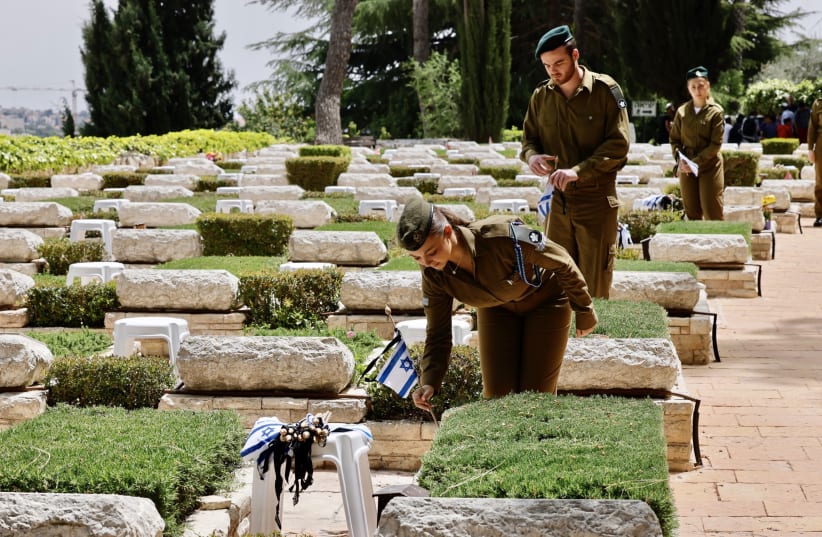Israel-Hamas War: What happened on day 105?
The IDF downed a Lebanese drone attempting to penetrate Israeli airspace • Rocket sirens sounded in Haifa • Hamas delegation visits Russia
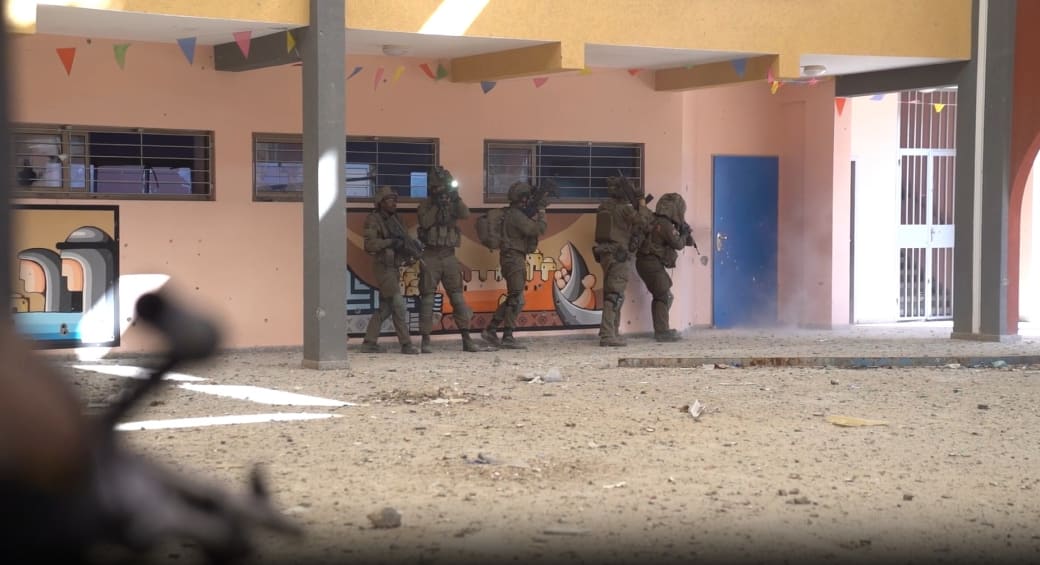

IDF strikes Islamic Jihad leader released in Gilad Schalit deal
Wael Abu-Fanounah was originally arrested in Israel on December 12, 1989, and was sentenced to three life sentences for his terrorist activities.
Deputy Head of Information for the Palestinian Islamic Jihad organization Wael Makin Abdallah Abu-Fanounah was targeted and killed by the IDF in an airstrike on Thursday, the military announced on Friday in a joint statement with the Israel Security Service (Shin Bet.)
Fanounah was originally arrested in Israel on December 12, 1989, and was sentenced to three life sentences for his terrorist activities, but was released in 2011 as part of the Gilad Schalit prisoner deal.
Fanounah then served as deputy to Khalil al-Hayya, the Northern Gaza Strip Commander of the Palestinian Islamic Jihad. Since 2017, before assuming his role as deputy head of the organization's Information Network, Fanounah was responsible for producing terror videos related to rocket attacks on Israeli territory and creating and disseminating documentation of Israeli captives as part of the psychological warfare conducted by terror groups in Gaza against Israeli residents.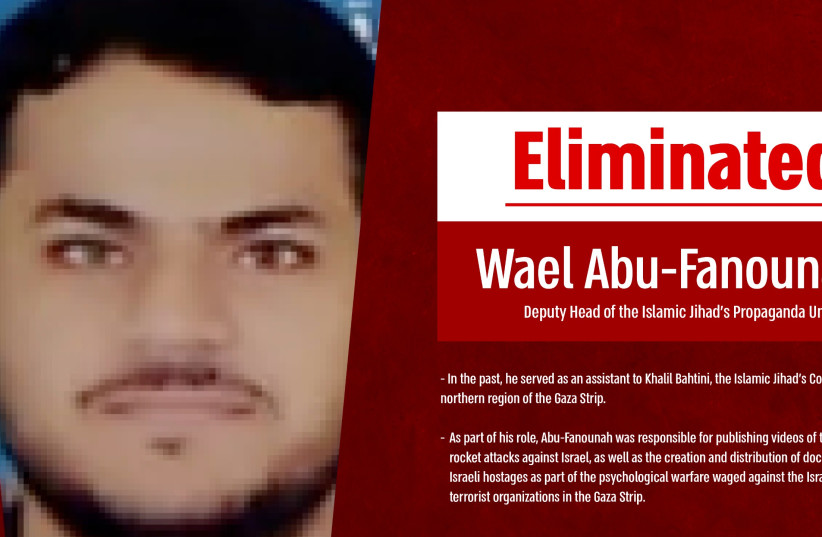
IDF continues battling in Gaza
IDF troops are continuing to operate within Gaza, coordinating with the Israeli Air Force to conduct precise strikes based on the information received from the ground.
Soldiers from the 179th 179th Armored Brigade "Ram" came under fire from terrorists armed with RPGs in central Gaza on Thursday. Subsequently, the soldiers scanned the area and the structure where the terrorists were operating, discovering RPG launchers, Kalashnikov rifles, and military equipment.
In the northern sector of Gaza, the 5th "Sharon" (Reserve) Infantry Brigade neutralized several armed terrorists involved in recent attacks on IDF troops that occurred in northern Gaza. The soldiers attacked and killed the militants with the assistance of tank fire and aerial support from the Air Force.
IDF announces death of Staff-Sgt. Ori Gerby, who succumbed to wounds in Gaza
Gerby's city, Herzilya, mourned his passing after he passed away due to his wounds.

The IDF announced on Friday that Staff-Sgt. Ori Gerby, 20, from Herzliya, has died from wounds he sustained on Wednesday in combat in the southern Gaza Strip.
He was a combat soldier in the Givati Brigade. Gerby's death brings the number of slain troops in the IDF's ground operation against the Hamas terror organization to 194 fallen soldiers.
Gerby's city, Herzilya, mourned his passing after he passed away due to his wounds after two days of treatment in the hospital.
Herzliya, a city in mourning
Herzliya Mayor Moshe Padlon shared condolences after the announcement of the soldier's death.
"The city of Herzliya is in pain and will mourn the death of Sgt. Ory Gerby, the hero, a resident of the city," Padlon said. "Uri fought for the country he loved so much, and the pain is unbearable. We hug the family members and share in their grief. May his memory be blessed."
Gerby is expected to be laid to rest at a military cemetery in Herzliya at 11 a.m. on Friday.
Go to the full article >>Netanyahu: There will be a PA-run Palestinian state without me
This conflict between Israelis and Palestinians is not about the absence of a Palestinian state, but about the existence of the Jewish state, he said.
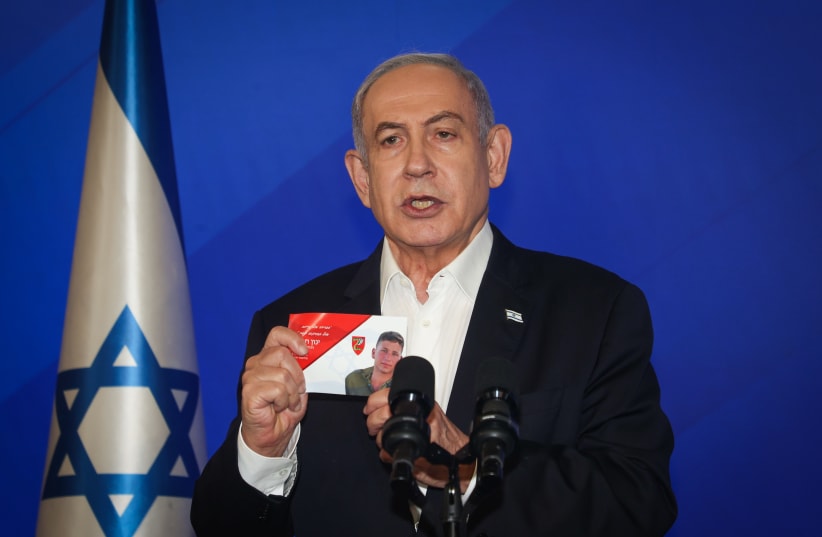
Prime Minister Benjamin Netanyahu linked his political future with the prevention of a Palestinian Authority-run Palestinian state, precisely as the Biden administration has been pressuring Israel to return to a two-state diplomatic process.
“I can say something about what they call the day after Netanyahu. I do not love to speak of myself in the third person. But those who speak of the day after Netanyahu are talking about the creation of a Palestinian state led by the Palestinian Authority,” the Prime Minister told reporters during a press briefing in Tel Aviv.
This conflict between Israelis and Palestinians is not about the absence of a Palestinian state, but about the existence of the Jewish state, he said.
Netanyahu at odds with the Biden administration
Netanyahu’s words put him at odds with the Biden administration, which has been Israel’s main ally in its war against Hamas.
He spoke amid speculation about increased tension between him and US President Joe Biden about the day after plans for Gaza, with the US renewing its drive for a Saudi normalization deal. This time around, the deal would more clearly include an Israeli agreement to Palestinian statehood.
Reporters have noted that it’s been several weeks since the two have spoken, even though they have been in close contact since the start of the Gaza war on October 7.
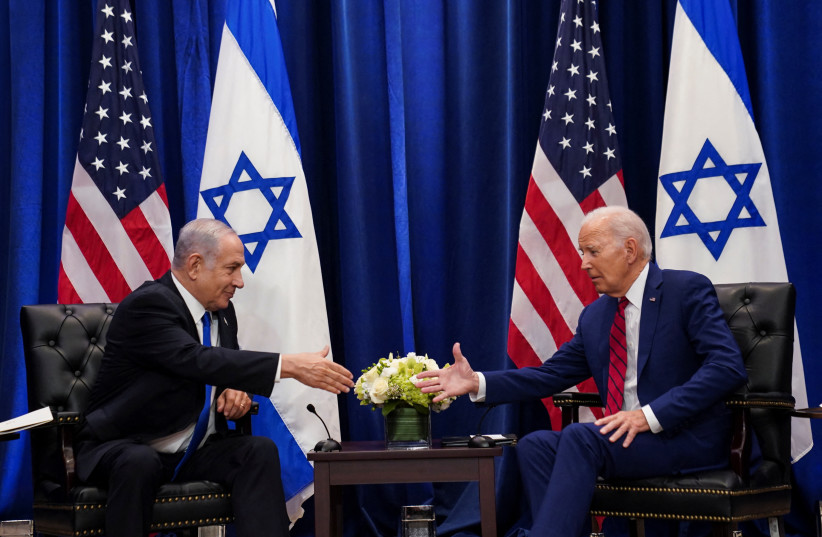
NBC reported on Wednesday that the Biden administration sought to circumvent Netanyahu by working to lay the groundwork for the day-after solutions through other Israeli politicians and civic society leaders.
Go to the full article >>All seven protestors detained by Israeli police released - report
The seven protesters who were detained for questioning on Thursday, among whom were relatives of hostages, were released by the police on Friday, according to reports by Israeli media.
Go to the full article >>Former Al Jazeera journalist: The region needs Israel’s help
Al-Ameri described how he slowly began to develop an understanding of the agendas and tendencies at the channel – as well as the dictations issued from above.
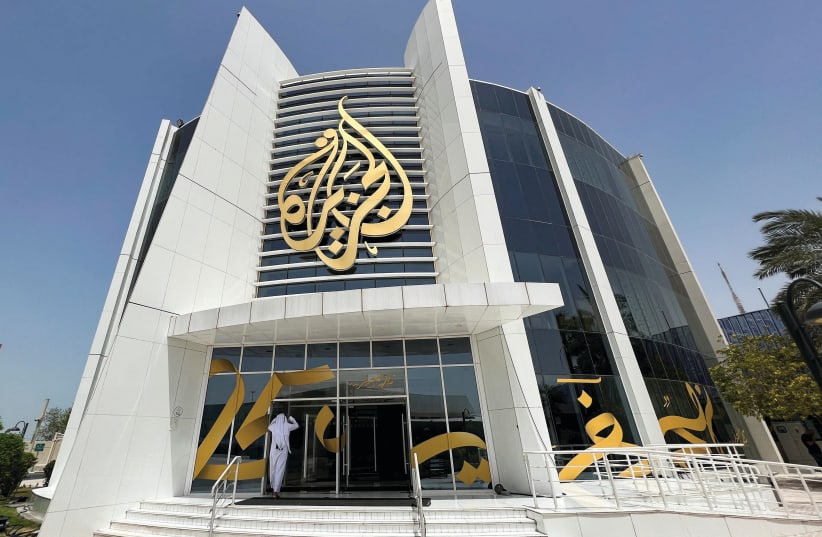
When asked if he understood he was being interviewed for an Israeli newspaper, Adnan Al-Ameri, a Yemeni-British journalist, wasn’t the least bit worried. “So be it. I’ll speak my mind however and wherever I need to.”
The ex-journalist for Al Jazeera of southern Yemeni descent spoke to The Jerusalem Post from London, where he has lived for the past several years, working as a freelance journalist and publicist.
He was born four decades ago in Warrington, England to parents who emigrated from Yemen, or, as he put it, “from Aden, in South Arabia.”
One year later the family decided to head back home to Aden, where he spent the next 14 years of his childhood.
They then moved all around the Gulf following his father’s work.
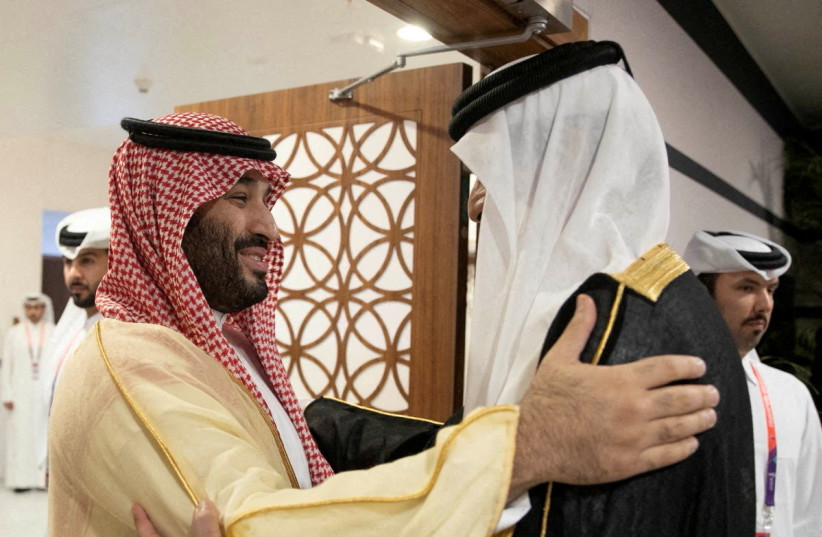
Al-Ameri studied journalism at the October 6 University in Cairo, then returned to London and worked as a producer for the Arab News Network (ANN), an Arabic-speaking channel set up by Assad regime opponent – and first cousin of Bashar Assad – Siwar al-Assad.
Following his short experience in London, Al-Ameri moved on to Doha to work for the media gargantuan and Qatari mouthpiece, Al Jazeera; more specifically, at their children and youth channel, JeemTV.
“I presented and produced shows about technology and other subjects. I didn’t even begin to grasp anything about the political aspect of the channel.”
Broadcasting in the name of the Sheikh
Al-Ameri described the first period of his work for the Qatari mouthpiece as uneventful – “but then everything changed when all the problems in the Gulf began.”
By this, he was referencing major and interconnected events which took place in the Gulf during the mid-2010’s; namely the military operations against the Houthis in Yemen led by a coalition of Gulf states, the Yemeni civil war, and the excommunication of Qatar by the other Gulf nations.
“One day the producers asked me to transfer from the children’s channel and become a news anchor for the main TV station. I refused politely at first, and then they started exerting pressure in all kinds of ways.”
Why was it so important for the Qatari media group to move Al-Ameri to the main channel? It’s not implausible to assume that Al-Ameri would have constituted a fine token for Qatar’s pedestal. In the civil war, the southern part of
Yemen was aligned with Saudi Arabia and the UAE, who led the boycott on Qatar. Therefore, a southern Yemeni who broadcasted in Qatar’s name could have been perceived as an asset for the forcefully secluded nation.
“When you work for their news channel, they need you to promote their Muslim Brotherhood agendas, and if you’re not there ideologically, they’ll make sure to buy you off.
“But regardless of the temptations they tried to offer – and there were many – I still said no. Eventually, they turned from luring techniques to applying different methods of pressure, which I won’t mention here. With all my family and friends in the south [of Yemen], it all started to get to me, and I was starting to feel unsafe at my workplace.”
Al-Ameri described how he slowly began to develop an understanding of the agendas and tendencies at the channel – as well as the dictations issued from above.
“There’s a lot of propaganda going around there, much of it dictated by the regime itself. Ahmad Alyafei, the executive director, even had a direct telephone line to the Amiri Diwan (the sheikh’s main executive office). I witnessed several times how anchors would meet for lunch, and they were told to tweet this or say that.”
As for his former co-workers, he added: “Much of the staff there are of Palestinian descent. Of course, they’re all aligned with Hamas. No Fatah loyalists are to be found there, nor anyone who doesn’t affiliate with Hamas or Qatar’s agendas.”
Later, full of insights about his work for a widely censored media, Al-Ameri left Qatar and returned to the UK.
The gospel of the South
The southern part of the Arabian Peninsula is a poverty-stricken area, torn by civil war, in what appears to be a vast battlefield for proxy wars between traces of Iranian, Qatari, and Saudi Emirati influences.
The country internationally recognized as Yemen is currently split between the northern part with its capital in Sana’a, where a Houthi-led government is in alliance with the Muslim Brotherhood party Al-Islah (notedly, the Houthis are Iranian-backed Shia, whereas the Muslim Brotherhood is Sunni), while the southern part is claimed by a Saudi Arabia and an UAE-backed independentist faction, eager to proclaim its statehood of South Arabia, with Aden, the important port city as its capital.
If this partition of Yemen to north and south sounds familiar, it may be because a similar one existed from the mid 1960’s and up until the Yemeni unification in 1990 between the northern Nasserist Yemen Arab Republic, and the southern Communist People’s Democratic Republic of Yemen, albeit for different ideological reasons.
As a native of Aden, Al-Ameri said he views himself as an unofficial ambassador of the independent South Arabia, with a mission to use his platforms to carry the voice of this forgotten cause worldwide.
“The government in Sana’a claims the entirety of the land, including our own areas – while we only strive for self-rule and independence in the south. We have no claims up north. It only goes to show who really is the aggressor.”
Al-Ameri also stressed the ideological differences between the north and the south. “Look at the Houthi slogan for instance. It openly says, after wishing death to America and Israel, ‘a curse upon the Jews.’ This is racist rhetoric – from a formal form of government! You won’t find much of that in the south.”
Indeed, he added, as a port city open to the world which also underwent a period of British rule, Aden was always more cosmopolitan and inclusive than its northern inland counterparts.
As for the current war in Gaza, Al-Ameri explained that local Muslim Brotherhood-affiliated actors and the Houthis have now begun to speak with one voice, both praising the Iranian-backed attacks against cargo ships and the disruption of global commerce in the Red Sea.
Here too, just like in the case of Hamas as a Sunni Muslim Brotherhood branch guided by the Shia Islamic Republic of Iran, a notable collaboration of the Qatari and Iranian axes is present.
“Al Jazeera also started to show support for the Houthis and their attacks,” he emphasized, urging Israel to join the maritime fight in the Red Sea. “Just as these two opposing axes can collaborate at the convergence of their interests – so too Israel must seize the moment and join forces with allies in Saudi Arabia and the UAE and lend us a hand in securing the Red Sea.”
Al-Ameri doesn’t hide the challenges his people face in the South. “What is needed is maritime support. The south can benefit from Israel’s knowledge and capabilities. We have brave fighters and we’re at a tactical advantage, as we have shown the Houthis in our past campaigns. But we’ve never had the chance to train at sea, which is something in which Israel has much experience. And if Israel joins openly – this could be a game changer.”
Al-Ameri isn’t hesitant to discuss an alliance between Israel and an Arab force in Yemen openly.
“Let me reassure you that though people may have their prejudices, they’re also very intrigued,” Al-Ameri explains calmly. “They know that our own allies see in Israel a potential ally and we trust them wholeheartedly. Even during the war there were videos circulating online showing people from the South tearing away billboards in support of Gaza.”
“I have a dream of visiting Israel, maybe even through a formal invitation,” he allows himself to drift away. “I want to host a Twitter Space from Tel Aviv, document everything I see for the eyes of our youth, showcase to the youth of South Arabia that Israelis are human just like us, that they live and work like us, that they have cafes and tourism and all. This would make an immense impact and fill their hearts with hope for a better future.”
Israel-Hamas War: What you need to know
- Hamas launched a massive attack on October 7, with thousands of terrorists infiltrating from the Gaza border and taking some 240 hostages into Gaza
- Over 1,200 Israelis and foreign nationals were murdered, including over 350 in the Re'im music festival and hundreds of Israeli civilians across Gaza border communities
- 132 hostages remain in Gaza, IDF says
